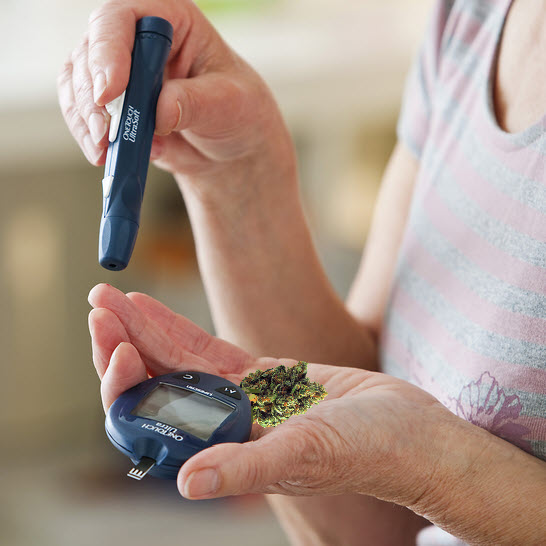
CBD for Diabetes – What the latest medical studies have found about CBD for diabetics
With more than 37.3 million Americans suffering from diabetes, this serious condition needs to be addressed.
Diabetes is so common that we probably all know someone who has it. Unfortunately, 1 in 5 people affected aren’t even sure they have the condition. This is not good news because there are serious complications that can arise from diabetes. These include nerve damage (neuropathy), cardiovascular disease, foot damage, kidney damage, Alzheimer’s, and more.
Once you have diabetes, it can be very difficult to reverse. For type 1 diabetes, treatment requires regular insulin injections, counting carbohydrates, and constantly checking blood sugar levels. Meanwhile, for type 2 diabetes, this involves a complete lifestyle change and checking blood sugar levels, as well as some diabetes medications that may require insulin, prescription drugs, or both.
However, cannabidiol (CBD), a powerful anti-inflammatory cannabinoid and non-psychoactive component in cannabis, has shown promise in treating and preventing diabetes—naturally.
Finally, CBD works with the endocannabinoid system, which helps regulate many important functions in the body, including immunity, appetite, sleep, pain, and mood. The endocannabinoid system is also important in helping the body maintain homeostasis.
What the studies say
There are several studies backing the claims: CBD can actually help people with diabetes.
Type 2 diabetes is the most common form of diabetes and is strongly associated with obesity. There are many studies supporting the use of CBD and THC to prevent excess weight gain and help people keep it off. In 2020, a review found that CBD showed promise for positively impacting factors that lead to insulin resistance, metabolic syndrome, and type 2 diabetes. Researchers also found that CBD was effective in reducing inflammation while altering the way the body metabolizes glucose.
In an older study from 2017, researchers found that CBD was effective in greatly reducing neuropathy caused by diabetes. Neuropathy is characterized by muscle weakness, tingling, and numbness that would otherwise be treated with strong painkillers. With CBD, you no longer have to rely on medication to treat neuropathy.
A study published in the medical journal Drug and Alcohol Dependence in 2020 shared the results of a survey conducted from 2005 to 2018, which included 340 participants with diabetes. They were asked about their cannabis use, including THC or CBD, in the last 30 days. Results showed that 78% of participants reported using cannabis that was not prescribed by a doctor. “Diabetes patients may use cannabis for medical reasons but do not have a prescription,” explained Omayma Alshaarawy, MBBS, PhD, lead author of the study.
In an article in EndocrineWeb, Rory Batt MSc, exploring the connection between type 2 diabetes, CBD and the endocannabinoid system, CBD may also have pancreatic health benefits in people with the condition. “CBD may also help protect the pancreas from destruction by overactive immune cells. What this effectively means is that someone may be able to produce insulin on their own for longer. However, if they don’t eventually change their diet as well, they will inevitably end up with a pancreas that can’t produce insulin — but CBD could greatly increase the time until then.”
Last May 2021, the results of a phase II study showed that taking CBD in pill form sublingually reduced pain scores by approximately 50% in patients with diabetic peripheral neuropathy. The randomized, double-blind, placebo-controlled study involved 54 patients suffering from painful diabetic neuropathy affecting their feet. They were randomized to receive Pure Green Pharmaceutical’s proprietary 1:1 20 mg CBD sublingual tablets three times a day or a placebo.
Pure Green reported that the patients given the treatment experienced significantly less pain compared to the placebo group. Those given CBD also reported statistically significant changes in quality of life and improvements in anxiety and sleep quality.
“To achieve clinical and statistical pain relief for these patients in just a few weeks is very gratifying and frankly unexpected. Interestingly, the results of this placebo-controlled study mirrored those of Pure Green Pharmaceuticals’ open-label pDPN study, in which both studies showed a significant reduction in pain scores of approximately 50 percent. Patient safety always comes first and has been our primary marker. In neither of the two clinical trials were there any side effects in patients taking medication,” said Dr. Debra Kimless, Pure Green’s Chief Medical Officer and Registered Anesthesiologist.
Other ways CBD helps manage diabetes
There are other ways that CBD can help with diabetes, particularly chronic inflammation that causes blood sugar levels to keep rising until diabetes occurs. The powerful anti-inflammatory properties of CBD help endocannabinoid receptors reduce inflammation, which also lowers blood sugar levels.
In addition, the endocannabinoid system plays an important role in promoting homeostasis as well as the body’s response to the decrease and increase in insulin. The lack of insulin production leads to diabetes, but CBD has been shown to improve the endocannabinoid system, helping to increase insulin secretion and promote homeostasis.
What to do if you want to be treated with CBD for diabetes
As of this writing, there is still no cure for diabetes and it is still not a condition that has been recognized by the FDA and medical authorities as being treatable with cannabis.
But given the promising studies available to us, as well as anecdotal evidence, patients with diabetes are encouraged to speak to cannabis-savvy physicians if they wish to use CBD to complement their existing therapies to manage the symptoms of diabetes and keep under control.
CBD AND DIABETES, READ MORE..

CANNABIS STRAINS FOR DIABETES, WHERE SHOULD YOU START?
OR..

DOES CANNABIS LOWER DIABETES RATES IN WOMEN, NEW STUDY!

Post a comment: